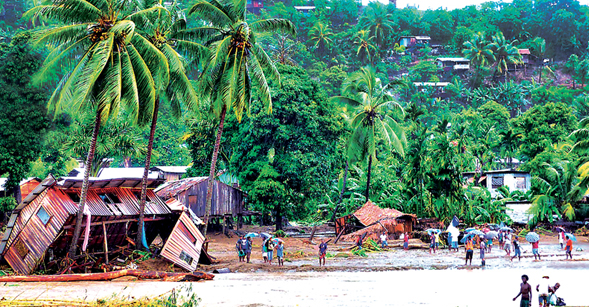Paradise in Peril
One student crusades to keep a WWII landmark afloat.

This story is featured in the fall 2014 issue of 360:The Magazine of San Diego State University.
The first time Eileen Natuzzi visited the Solomon Islands, she was keeping a family promise.
The second time, she was trying to save lives.
There was a third time, and a fourth, and before long, Natuzzi’s life was bound to the islands as tightly as the sutures bound the incisions she stitched up during surgery.
Natuzzi is not your typical San Diego State University student. She finished medical school before most of her classmates in the Graduate School of Public Health had learned to read. Since then, she has lived with one foot on her home turf and the other on a Pacific island nation largely forgotten by the United States.
As a kid, Natuzzi heard family stories about the people of the Solomon Islands, who healed and harbored American and other Allied servicemen stationed in the Pacific during World War II. Among the thousands of soldiers who didn’t make it home was Natuzzi’s uncle, William “Billy” Moore Stack. He perished aboard the USS Quincy near Guadalcanal.
Honoring a war hero
A desire to honor Billy first brought Natuzzi to the Solomon Islands with two family members in 2004. They arrived with a watertight capsule containing letters from Billy’s siblings and a promise to commemorate his service. In 2006, the family formed the non-profit William “Billy” Moore Stack Foundation to promote education in the islands.
At least twice a year since then—funded by the foundation—Natuzzi has led American and Australian medical teams to the Solomon Islands. They bring in textbooks and equipment, and train local physicians in performing life-saving procedures and surgeries.
She also mobilized health care professionals from SDSU and other U.S. universities in a collaboration with the Stack Foundation and the American Society for Gastrointestinal Endoscopy. They formed the Solomon Islands Living Memorial Project, dedicated to improving standards of care by training local doctors at the country’s sole surgical hospital in Guadalcanal.
A shift to prevention
Natuzzi’s work saved lives, but she grew dissatisfied with an endgame approach to intervention. An endoscopy study by the Living Memorial Project found exceptionally high rates of Helicobacter pylori, a chronic bacterial infection known to cause stomach ulcers, bleeding and cancer.
“The only way ahead for me was to shift to a prevention strategy,” Natuzzi said. She enrolled in SDSU’s public health program.
Last year, with only her thesis left to write, Natuzzi applied for a research Fulbright to build health care capacity in the Solomon Islands. She knew it was a gamble—only two Fulbright researchers in the last 50 years had received grants to work there. The awards routinely fund research in higher profile countries like China, Japan, South Korea and Indonesia.
In the end, Natuzzi was an alternate, but she regards the Fulbright process as a positive step. “I was able to increase awareness of the Solomon Islands through the screening process, and that was one of my goals,” she said.
State Department interest
Then in April, disaster struck. Tropical Storm Ita pummeled the islands, destroying hundreds of homes and displacing thousands of people.
A witness to the devastation, Natuzzi wrote an article for The Diplomat. In it, she suggested the Solomon Islands as a model for multinational initiatives to protect small Pacific nations from extreme weather events and the deadly infectious diseases spawned by them. To her surprise, the U.S. State Department noticed.
Natuzzi provided information about the Solomon Islands to the office of Secretary of State John Kerry, and on Aug. 13, Kerry became the first-ever U.S. Cabinet-level member to visit the Pacific nation.
With Prime Minister Gordon Lilo, Kerry toured the flood damage and laid the groundwork for a renewed relationship between the two countries.
Natuzzi continues to work with Washington and the Solomon Islands to mitigate the effects of climate change and strengthen health systems. She is determined to keep U.S. foreign policy focused on the southwestern Pacific as
keenly as it was when her Uncle Billy served.



